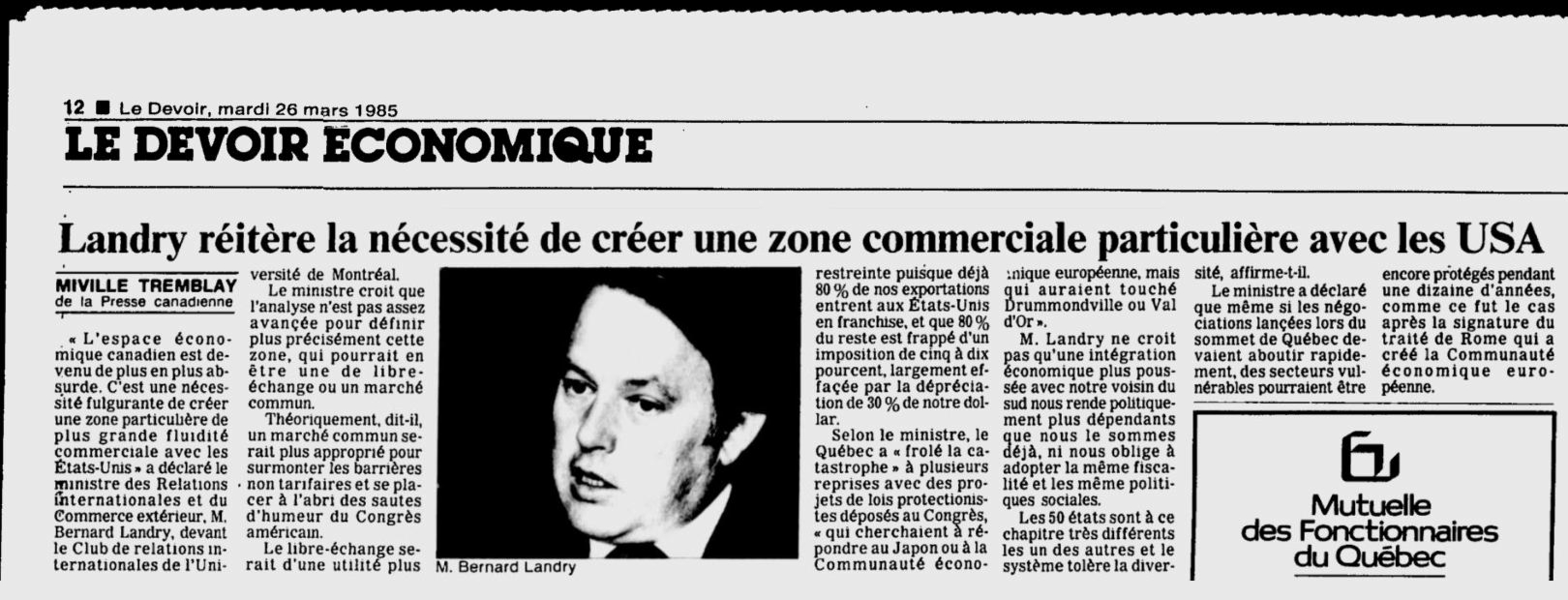Landry reiterates the necessity of creating a special economic zone with the USA (Le Devoir, Tuesday, 26 March 1985)

ECONOMIC LE DEVOIR
Landry Reiterates the Necessity of Creating a Special
Economic Zone with the USA
MIVILLE TREMBLAY of the Canadian Press
Le Devoir, Tuesday, 26 March 1985
|
|
Original French |
English Translation |
|
|
LE DEVOIR ECONOMIQUE |
ECONOMIC LE DEVOIR |
|
|
Landry réitère la nécessité de créer une zone commerciale particulière avec les USA |
Landry reiterates the necessity of creating a special economic zone with the USA |
|
|
MIVILLE TREMBLAY |
MIVILLE TREMBLAY |
|
1. |
« L’espace économique canadien est devenu de plus en plus absurde. C’est une nécessité fulgurante de créer une zone particulière de plus grande fluidité commerciale avec les Etats-Unis » a déclaré le ministre des Relations internationales et du Commerce extérieur, M. Bernard Landry, devant le Club de relations internationales de l’Université de Montréal. |
"The Canadian economic space has become more and more absurd. It is a burning necessity to create an special zone of greater commercial fluidity with the United States," declared the minister of International Relations and Foreign Trade, Mr. Bernard Landry, to the International Relations Club of the University of Montreal. |
|
2. |
Le ministre croit que l’analyse n’est pas assez avancée pour définir plus précisément cette zone, qui pourrait en être une de libre-échange ou un marché commun. |
The Minister believes that the analysis is not sufficiently advanced to more precisely define such a zone, which might be a free trade zone, or a Common Market. |
|
3. |
Théoriquement, dit-il, un marché commun serait plus approprié pour surmonter les barrières non tarifaires et se placer à l’abri des sautes d’humeur du Congrès américain. |
Theoretically, he says, a Common Market would be more appropriate to overcome non-tariff barriers and would be placed outside the sudden mood-swings of the American Congress. |
|
4. |
Le libre-échange serait d’une utilité plus restreinte puisque déjà 80 % de nos exportations entrent aux États-Unis en franchise, et que 80% du reste est frappé d’un imposition de cinq à dix pourcent largement effacée par la dépréciation de 30 % de notre dollar. |
Free trade would be of more limited usefulness since 80% of our exports already enter the United States duty-free, and the 5% or 10% tax on 80% of the rest is largely erased by the 30% depreciation of our dollar. |
|
5. |
Selon le ministre, le Québec a « frôlé la catastrophe » à plusieurs reprises avec des projets de lois protectionnistes déposés au Congrès, « qui cherchaient à répondre au Japon ou à la Communauté économique européenne, mais qui auraient touché Drummondville ou Val d’Or ». |
According to the minister, Quebec has had "brushes with disaster" again and again due to protectionist draft laws laid before Congress "which were aimed at Japan or at the European Economic Community, but which would have affected Drummondville or Val d’Or". |
|
6. |
M. Landry ne croit pas qu’une intégration économique plus poussée avec notre voisin du sud nous rende politiquement plus dépendants que nous le sommes déjà, ni nous oblige à adopter la même fiscalité et les même politiques sociales. |
Mr. Landry does not think that deeper economic integration with our neighbour to the south would make us politically more dependent than we are already, nor oblige us to adopt the same fiscal and social policies. |
|
7. |
Les 50 états sont à ce chapitre très différents les un des autres et le système tolère la diversité, affirme-t-il. |
The 50 States in this respect are very different one from the other and the system tolerates that diversity. |
|
8. |
Le ministre a déclaré que même si les négociations lancées lors du sommet de Québec devaient aboutir rapidement, des secteurs vulnérables pourraient être encore protégés pendant une dizaine d’années, comme ce fut le cas après la signature du traité de Rome qui a créé la Communauté économique européenne. |
The minister declared that even if negotiations launched during the Quebec summit were quickly achieved, vulnerable areas could still be protected for a dozen years, as was the case after the signing of the treaty of Rome which created the European Economic Community. |